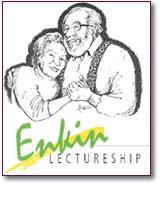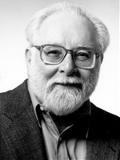Celebrating Humanitarianism in Research
 Dr. Murray Enkin, professor emeritus of the Departments of Obstetrics & Gynecology and Clinical Epidemiology and Biostatistics, and his partner Eleanor Enkin, have made many important contributions to clinical research in pregnancy and childbirth and have been strong advocates for family centred maternity care, for consumers’ choices in obstetrics and for midwifery. More generally, they have been advocates of a wider view of science in the service of humanity. They have spent a lifetime challenging clinical and scientific consensus. In 2012, Dr. Enkin received the Order of Canada for “his contributions to maternal care and the development of midwifery as a recognized profession in Canada.”
Dr. Murray Enkin, professor emeritus of the Departments of Obstetrics & Gynecology and Clinical Epidemiology and Biostatistics, and his partner Eleanor Enkin, have made many important contributions to clinical research in pregnancy and childbirth and have been strong advocates for family centred maternity care, for consumers’ choices in obstetrics and for midwifery. More generally, they have been advocates of a wider view of science in the service of humanity. They have spent a lifetime challenging clinical and scientific consensus. In 2012, Dr. Enkin received the Order of Canada for “his contributions to maternal care and the development of midwifery as a recognized profession in Canada.”
Murray and Eleanor were instrumental in the development of systematic reviews of diagnostic, therapeutic and supportive care in pregnancy and childbirth through the development of the Oxford Database of Perinatal Trials: the precursor to the Cochrane Collaboration. The Cochrane Collaboration is an international organization with centres in 12 countries, involving researchers from around the world dedicated to systematically reviewing, summarizing and disseminating research information on the effects of health care interventions in over 45 distinct areas of human health. Consumers are highly represented in the Collaboration.

In his professional and academic capacity, Murray has been a suitably outspoken skeptic about the value of technology in care and a passionate advocate for the importance of considering alternative forms of care outside the “medical model”. He has recognized the critical role of support, caring and nurturing, and has been a vigorous promoter of the autonomy and vital role of the consumer in health care.
The Enkin Lectureship serves as a focus on the essential role of science in the service of humanity, and the key role humanitarian values should play in science in general and in clinical research in particular.
The final Enkin Lectureship was held April 2017.
Past Speakers:
- 2017 – Alex Jadad: On birth, death, and how to enjoy the interval!
- 2013 – Jean Chamberlain: Steps of Risk, Hope and Purpose: What will it take to save Mothers and Newborns in the 21st Century? Discussant: Henry Muggah
- 2012 – Jonathan Lomas: The Good the Bad and the Ugly of Being Human, Not Rational: Implications for Researchers, Providers and Patients
- 2011 – Arthur Schafer: Bio-medical Conflicts of Interest and Why they Matter. Discussants: PJ Devereaux and Mitch Levine
- 2008 – Robert Buckman: Bringing Humanitarianism to Medicine: Intuition or Tuition? Discussant: Gord Guyatt and Eileen Hutton
- 2007 – Sholom Glouberman: Birth and Death: The Limits of Scientific Contributions. Discussants: Peter Rosenbaum and Alex Jadad
- 2005 – Martin Richards: Reproductive choice and new genetic reproductive technologies. Discussant: Jeff Nisker.
- 2003 – Barbara Katz Rothman: Between the ivory tower and the front lines: research, women and health. Discussants: Vicki Van Wagner and Murray Enkin
- 2002 – Bill Silverman: The pitfalls of certitude in clinical medicine. Discussant: Cathy Risdon
- 2000 – Samantha Nutt and Eric Hoskins: Humanitarianism and war: two McMaster physicians talk about their work with war-affected populations
- 1999 – Iain Chalmers: How might health and social researchers serve people more effectively? Discussant: Alex Jadad
